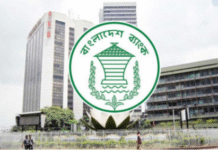‘If there is any law about it, revenue income will be increased and transparency will be established’
A marked difference in statistics among government key agencies concerned has deteriorated the quality of fiscal planning over the last four years, says Centre for Policy Dialogue (CPD) yesterday.
Resultantly, targets of fiscal framework of all indicators, including revenue mobilisation, public expenditure and deficit financing, remained largely unattained, it said in a media briefing on the upcoming national budget and state of the economy in the city.
“Gap between fiscal plan and its implementation is increasingly widening just because of confusing statistics,” said CPD distinguished fellow Debapriya Bhattacharya.
He said there is a gross mismatch between the NBR and the Finance Ministry data failing to gauge true picture of the economy.
There is a growing concern over the quality of term loan data as loans against trust receipts were also often accounted under the term loan, he said.
Paddy farmers fail to get fair prices of their produces due to insufficient rice production data, he said.
CPD research fellow Towfiqul Islam Khan in his presentation paper said Bangladesh has become self-sufficient in rice production.
However, in recent years, it is also observed that Bangladesh has been importing significant amount of rice, particularly from India, despite demand-supply miscalculation.
“The accurate measurement of demand-supply gap of food grains has become elusive for the policymakers since available estimates based on Bangladesh Bureau of Statistics data do not conform to the reality on the ground.”
CPD said the weakest link among all the indicators is net foreign borrowing.
According to the CPD, fiscal gap of total expenditure increased to abnormally 15.4% in fiscal year 2014 from 9.2% of GDP in fiscal year 2013, and likewise during the period, ADP to 13.9% from 9%, total revenue to 16.2% from 8.3%, NBR revenue to 18.1% from 8%, deficit to 13.1% from 11.9%, net foreign borrowing to 76.7% from 50.4% and net domestic borrowing fell to 12.3% from positive 4.4%.
Fiscal gap is calculated as budget figures minus actual figures compiling data from the Ministry of Finance.
To come out of 6% growth cycle, Debapriya said a big push is needed for institutional reform.
“But nothing is sustainable without political settlement as we can gain experience from neighbouring country India and Latin America where national consensus existed,” he said, terming the outgoing fiscal year a democratic discomfort year.
The civil society think tank opined that the country may break its stagnant growth, taking the advantages of lower inflation, declining interest rate, stable exchange rate, manageable fiscal deficit, positive balance of payment, foreign exchange reserve and low level of global commodity prices.
The think tanks recommended forming five independent commissions for statistics, agriculture price, local government financing, public expenditure review and financial sector reform towards better macroeconomic management.
It also advocated for expediting the reform agendas such as public services act, PPP act, privatisation, financial reporting act and others, which remain stalled.
The CPD distinguished fellow also urged the government to formulate a law regarding untaxed money.
“If there is any law about it, revenue income will be increased and transparency will be established.”
About the “fast tracked projects”, the CPD said out of six projects, four are on track and would be successful while the status of another two is conditional.
CPD Executive Director Mustafizur Rahman laid emphasis on increasing investment and productivity to attain the goal of ‘Vision 2021’ envisaged by the government, as the country is still far behind attaining the desired GDP growth.
“Good governance, strengthening local government and infrastructure development are also important to accelerate the growth.”
Source: Dhaka Tribune










